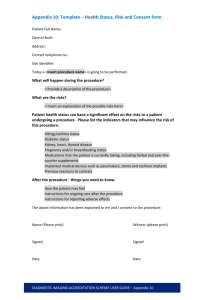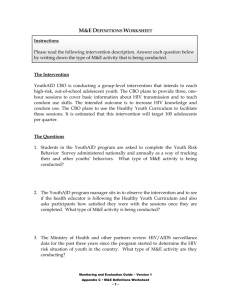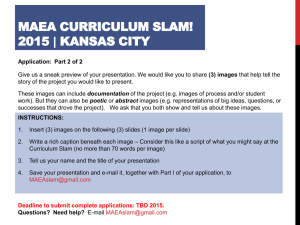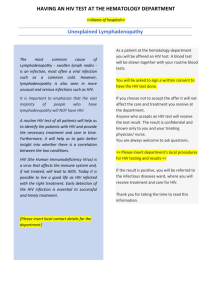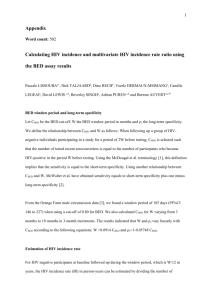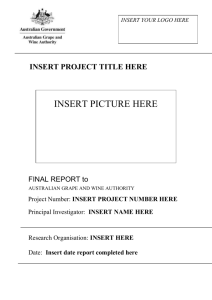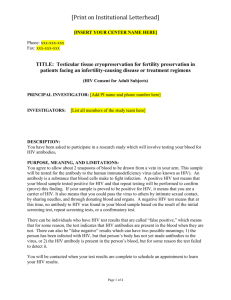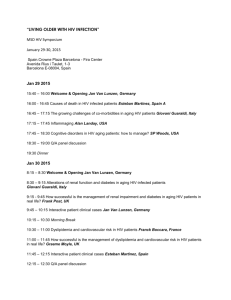Appendix A - BioMed Central
advertisement
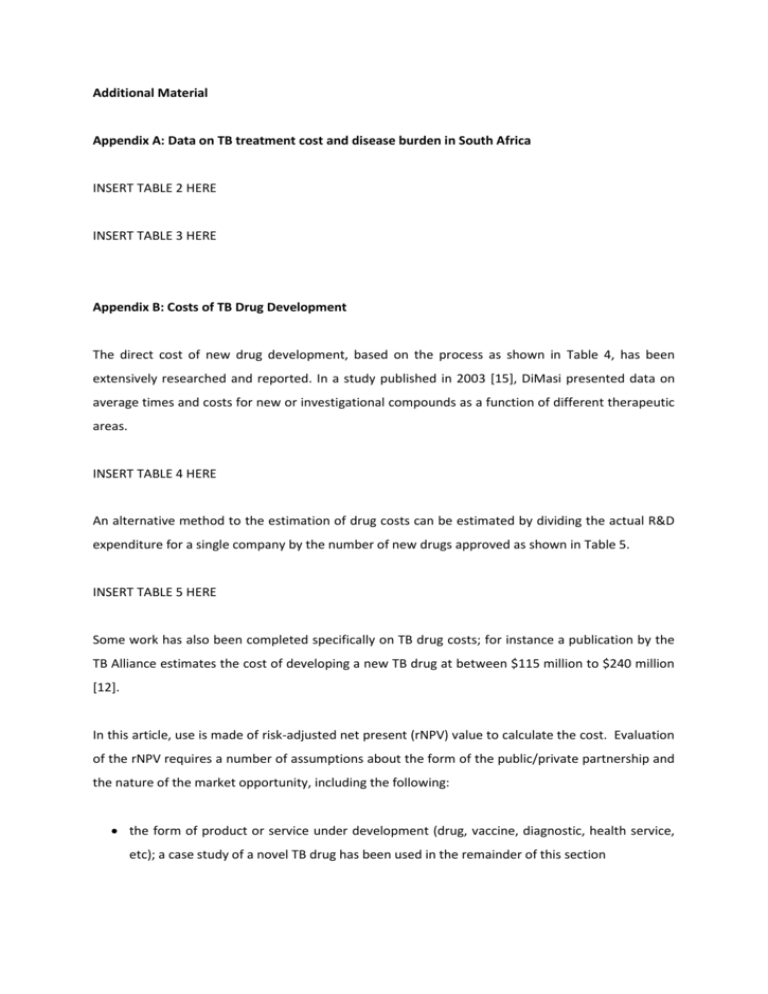
Additional Material Appendix A: Data on TB treatment cost and disease burden in South Africa INSERT TABLE 2 HERE INSERT TABLE 3 HERE Appendix B: Costs of TB Drug Development The direct cost of new drug development, based on the process as shown in Table 4, has been extensively researched and reported. In a study published in 2003 [15], DiMasi presented data on average times and costs for new or investigational compounds as a function of different therapeutic areas. INSERT TABLE 4 HERE An alternative method to the estimation of drug costs can be estimated by dividing the actual R&D expenditure for a single company by the number of new drugs approved as shown in Table 5. INSERT TABLE 5 HERE Some work has also been completed specifically on TB drug costs; for instance a publication by the TB Alliance estimates the cost of developing a new TB drug at between $115 million to $240 million [12]. In this article, use is made of risk-adjusted net present (rNPV) value to calculate the cost. Evaluation of the rNPV requires a number of assumptions about the form of the public/private partnership and the nature of the market opportunity, including the following: the form of product or service under development (drug, vaccine, diagnostic, health service, etc); a case study of a novel TB drug has been used in the remainder of this section the point at which the private sector partner is financially involved in the project (and hence what proportion of the development costs) the project development costs as a function of stage (such as Phase I, II and III) and time (see the Appendix for more details of standard drug development costs) the market volume and value for the product or services under developed (e.g. one million patients treated per year at a cost of $28 per patient) the gross margin for the product (revenue less cost of manufacture and marketing) the product’s selling price (usually $/treatment cost). The model assumes a market volume of 1·2 million patients at a treatment cost of $5·3 per patient. Peak revenues would be reached about 12 years after initiation of hit-to-lead optimisation, and would decline quickly after patent expiry (15 years from date of registration). The public sector licensee would receive an annual royalty of 10%, the discount rate applied is 8%, and a gross manufacturing margin of 50% would be realised. The success rates per stage as applied in the model were obtained from previously published data [14] [15] [37]. Table 2. South Africa’s Department of Health 2011/12 budget for TB treatment Amount Amount (R million) ($ million)* 118 14 MDR TB Drugs 2,120 249 TB Hospitalisation 1, 60 207 Management and Supervision of TB Treatment 335 39 TB Laboratory Support 356 42 Outpatient Visits 276 32 Other 465 55 Total 4,965 584 Budget Item First line TB Drugs *$1 = R8.5 (June 2012) Source: DoH [3] Table 3. TB statistics for South Africa (2010) Total Number Rate (per 100,000 population) Mortality (excluding HIV) 25,000 50 Mortality (including TB/HIV co-morbidity) 48,000 96 Prevalence 400,000 795 Incidence (including HIV) 490,000 981 Incidence (TB only) 300,000 591 HIV Incidence Completion Rate Case Detection Source: WHO [1] 60% of TB patients are HIV positive 73% of new smear positive cases 72% of total cases Table 4. Stage costs and duration for investigational compounds Cumulative Future Costs Duration Success Adjusted Cost ($ million) (years) Rate ($ million) 0·5 1 3% 20 20 1 1 5% 20 41·6 2 1 8% 25 69·9 Preclinical 5 2 10% 50 131·6 Phase I 23 1 20% 115 257·1 Phase II 20 2 30% 66·7 366·5 Phase III 137 2 67% 204·5 632·0 Phase IV 9 5 46% 19·6 Registration 5 1 81% 6·2 709·9 202·5 16 100% 526·9 709·9 Phase Hit Generation Hit to Lead Lead Optimisation Total Sources: DiMasi [15], Mathieu [14] Value ($ million) Table 5. Further Statistics on Drug Costs Number of drugs R&D Spending Per Total R&D Spending approved Drug ($ mill) 1997-2011 ($ mill) AstraZeneca 5 11,791 58,955 GlaxoSmithKline 10 8,171 81,708 Sanofi 8 7,909 63,274 Roche Holding AG 11 7,804 85,841 Pfizer Inc. 14 7,727 108,178 Johnson & Johnson 15 5,886 88,285 Eli Lilly & Co. 11 4,577 50,347 Abbott Laboratories 8 4,496 35,970 Merck & Co Inc 16 4,210 67,360 Bristol-Myers Squibb Co. 11 4,152 45,675 Novartis AG 21 3,983 83,646 Amgen Inc. 9 3,692 33,229 Company Source: Herper [36]

